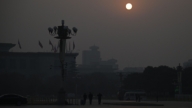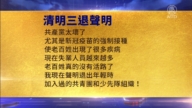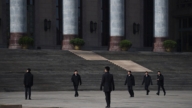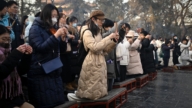【新唐人2013年04月10日訊】在中國,所謂的「情婦經濟」因為近來中共當局的反腐動作,而受到影響,其中包括中共官員情婦包住的高檔公寓出現空置;名錶、包包及服裝等名牌奢侈品的生意也大大銳減。但是,大陸媒體認為,反腐政策並不是中國奢侈品市場銷售成績減弱的主要原因。是這樣嗎﹖請跟本臺記者一起去了解。
中國大陸奢侈品的好日子正在受到衝擊。大陸媒體報導,去年(2012年)10月《機關事務管理條例》正式實施,其中明確規定:禁止政府採購奢侈品;接著,11月十八大召開,新領導人亮相,他們顯然意識到貧富懸殊、官員腐敗等涉及民生問題的重要性,反腐力度不斷加大,奢侈品公司感覺壓力變大。
而英國《泰晤士報》則報導說,中共反腐風暴令「情婦經濟」崩潰,官員情婦包住的高檔公寓出現空置﹔名錶、包包及服裝等名牌奢侈品,生意大減。
以2007年開業的北京「新光天地」商場舉例來說,「新光天地」每年以30%至50%的比率增長,並在2011年超過「杭州大廈」,成為中國銷售額最高的百貨商店。但反腐政策實施之後,去年,「新光天地」增長率下降到2.3%,商場銷售額位列第三的GUCCI名店,今年元旦之後,月銷售額平均下跌30%左右。
不過,美國「南卡羅萊納大學」艾肯商學院教授謝田認為,中國國內的奢侈品市場低迷,只是暫時性的掩人耳目,貪官情婦已經形成奢侈的生活習性,他們有可能出國採購或者推遲購買。
美國南卡羅萊納大學艾肯商學院教授謝田:「因為上面開始吹風,所謂打擊貪腐,下面自然有所收斂。但是新官上任三把火也好,這些口號每批官員上臺都會做,每次都會高唱反腐的口號,但是不會持久,很快官員購買奢侈品可能會稍收斂一下,可能半年以後風頭過後,他們會依然故我,還是繼續浮華、享受。」
中國人民大學早前的一項研究指出,中國大陸被立案調查的腐敗官員,60%都有全職情婦。官員們為供養和討好這些情婦,給她們購房、租房,還為她們購買名車、名錶、名服裝等奢侈品,出現所謂的「情婦經濟」,這些饋贈支出,遠超過官員的收入。
而「匯豐銀行」早前也曾經發佈對中國奢侈品行業的研究報告,報告說,中國二奶的高端消費速度和數量確實很可觀。但報告警告,如果當局出手反腐敗,官員包二奶情況收歛的話,奢侈品在中國市場的銷售很可能會受到影響。
可是,大陸媒體指稱,反腐政策並不是中國奢侈品市場銷售減弱的主要原因,迅速變化的消費者行為和市場才是。
北京《國情內參》首席研究員鞏勝利:「不僅高檔奢侈品,很簡單的北京的餐館業,數據出來比往前減少60%以上。如果中國長期以往靠官員消費來拉動,不是個好現象,任何一個法治健全的國家都不可能出現這個現象。靠官場拉動的經濟是非常危險的,如果繼續走下去的話,中國經濟的災難很快都到來。」
報導分析,奢侈品實體店面的業績下滑,不能代表反腐成效,因為購買奢侈品的通路選擇性很多,其中包括海外 消費和網路代購等等。而北京的二奶們,在風聲鶴唳下,也只能悄悄的「化明為暗」避避鋒頭。
據了解,近二十年來,大陸的副省級以上落馬高官,大多數是被政敵和情婦舉報,真正屬於中共黨內權力監督部門主動出擊查處的案例非常少。
採訪/田淨 編輯/黃億美 後製/郭敬
Mistress Economy VS Anti-Corruption
In China, the Chinese Communist Party’s (CCP) recent anti-corruption moves have affected the so-called “Mistress Economy.” More luxury apartments appear vacant; brand name business, watches, purses, and clothing, has sharply declined. However, Mainland media say the anti-corruption policy has little to do with performance of the Chinese luxury goods market. Is that true? Please read our report.
The good old days of luxury goods in China is being challenged. Mainland media reported that the Chinese regime clearly ordered the prohibition of government procurement of luxury goods in October 2012. During the 18th Congress, the new leaders recognized disparity between the rich and the poor. And that official corruption is affecting people’s livelihood.
Thus, anti-corruption efforts continue to be stepped up. The more official efforts to curb corruption, the more the pressure falls on luxury goods companies. British Times reported that the CCP’s anti-corruption storm has caused the mistress economy to collapse. More upscale apartments are vacant and the business of luxury watches, bags, and clothing is sharply declining. For example, Beijing’s Shin Guang shopping mall has had an annual growth rate of 30-50% since it opened in 2007. In 2011, it surpassed the Hangzhou Tower and became the number one shopping mall in China.
However, after the implementation of the anti-corruption policy last year, Shin Guang’s growth rate has dropped to 2.3%. Gucci Shop ranks 3rd in sales in Shin Guang mall; its monthly sales fell by an average of 30% since January 2013. However, Professor Xie Tian, from University of South Carolina Aiken Business School commented. He says the downturn of the luxury goods market is only temporary deceiving the public. Those mistresses are so used to luxury lives that they can buy luxury goods abroad or delay their purchase. Prof. Xie Tian: “Because anti-corruption is in the air, officials will show restraint now.
New leaders coming to power like to display anti-corruption slogans, which will not last very long—about six months. Half a year later, officials will resume their luxury lifestyle and continue to enjoy their good lives. An earlier study from the Renmin University of China pointed out that 60% of corrupt officials under investigation had a full-time mistress. Officials provided housing, cars, watches, name brand clothing and other luxury goods for their mistresses. Thus, the “mistress economy” was formed.
These luxury gifts for a mistress cost far more than the regular income of an official. Earlier, HSBC also released a research report on China’s luxury goods industry.
The report said China mistresses’ speed and quantity of consuming luxury goods were really impressive. The report also warned that if officials show any restraint in their mistress situations, luxury goods sales will likely be affected. However, Mainland media claimed that the weakened luxury goods market isn’t caused by the anti-corruption policy but by the changes of consumer behavior and the market. Gong Shengli, a principal researcher at National Conditions and Internal Reference: “(It’s) not only the high-end luxury goods, the simple restaurant industry in Beijing also shows a 60% reduction. If China’s economy depends on officials’ consumption, it is not a good sign. This scenario cannot happen in any sound rule-of-law country. Relying on officials to push the economy in this fashion is very dangerous. If this continues, China’s economic disaster will soon be here.”
According to analysis, the decline in sales of luxury goods does not indicate the success of the anti-corruption efforts, because there are many pathways to buy luxury goods, including overseas and Internet purchasing. Mistresses in Beijing are in panic, and they can hide and be quiet for the time being.
It is understood that, in the past two decades, the downfall of most high-ranking officials was caused by the work of political opponents or mistresses. Very few cases resulted from declined efforts by the CCP’s internal supervision departments.

























